Who Runs Cargo Ships: Cargo ships are massive vessels that transport goods and materials across the world’s oceans. While the operation of these ships may seem straightforward, it involves a complex hierarchy of personnel responsible for various tasks and duties. From the captain to the deckhands, each rank plays a crucial role in ensuring the safe and efficient transport of cargo.
The captain or master is the highest-ranking officer on a cargo ship and is responsible for the overall operation of the vessel. They make all major decisions, from navigating the ship to handling emergencies. The captain is also responsible for the safety of the crew and passengers.
Under the captain, there are several other ranks that make up the ship’s hierarchy, including the chief officer or first mate, second mate, third mate, and deckhands. Each rank has its own set of responsibilities and duties that contribute to the smooth functioning of the ship.
Hierarchy of Ship Crew
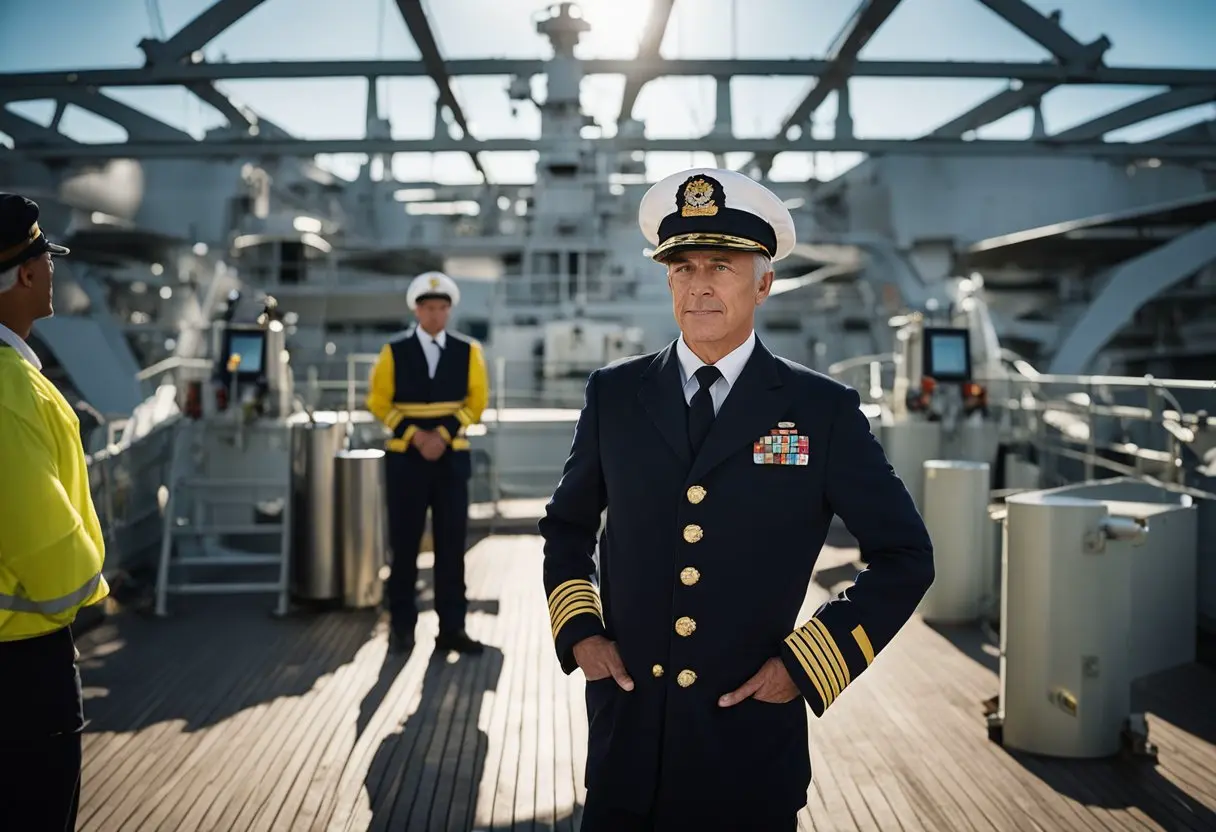
The crew of a cargo ship can be divided into different departments, each with its own responsibilities and ranks. The following are the main departments:
Master/Captain
The captain, also known as the master, is the highest-ranking officer on board. They are responsible for the overall operation of the vessel and the safety of the crew and cargo. The captain makes all major decisions, from navigating the ship to handling emergencies.
They are also responsible for ensuring that the ship complies with all national and international regulations. The captain is supported by other officers, including the chief officer, second officer, and third officer, who assist with navigation and other tasks.
Deck Department
The deck department is responsible for the navigation and maintenance of the ship. It includes officers and ratings who work on the ship’s deck. The chief officer, also known as the first mate, is the head of the deck department. They are responsible for the safety of the ship, cargo, and crew.
They also oversee the loading and unloading of cargo and ensure that the ship stays on course. Other officers in the deck department include the second officer and third officer. Ratings in the deck department include able seamen, ordinary seamen, and deck cadets.
Engineering Department
The engineering department is responsible for the maintenance and repair of the ship’s machinery and equipment. The chief engineer is the head of the department and is responsible for the safe and efficient operation of the ship’s engines and other machinery. They are supported by other officers, including the second engineer and third engineer. Ratings in the engineering department include electricians, oilers, and wipers.
Catering Department
The catering department is responsible for the provision of food and other services on board. The chief cook is the head of the department and is responsible for the preparation of meals and the cleanliness of the galley. They are supported by other ratings, including assistant cooks, stewards, and messmen.
Each department has its hierarchy of ranks and responsibilities. The crew works together to ensure the safe and efficient operation of the ship.
Roles and Responsibilities
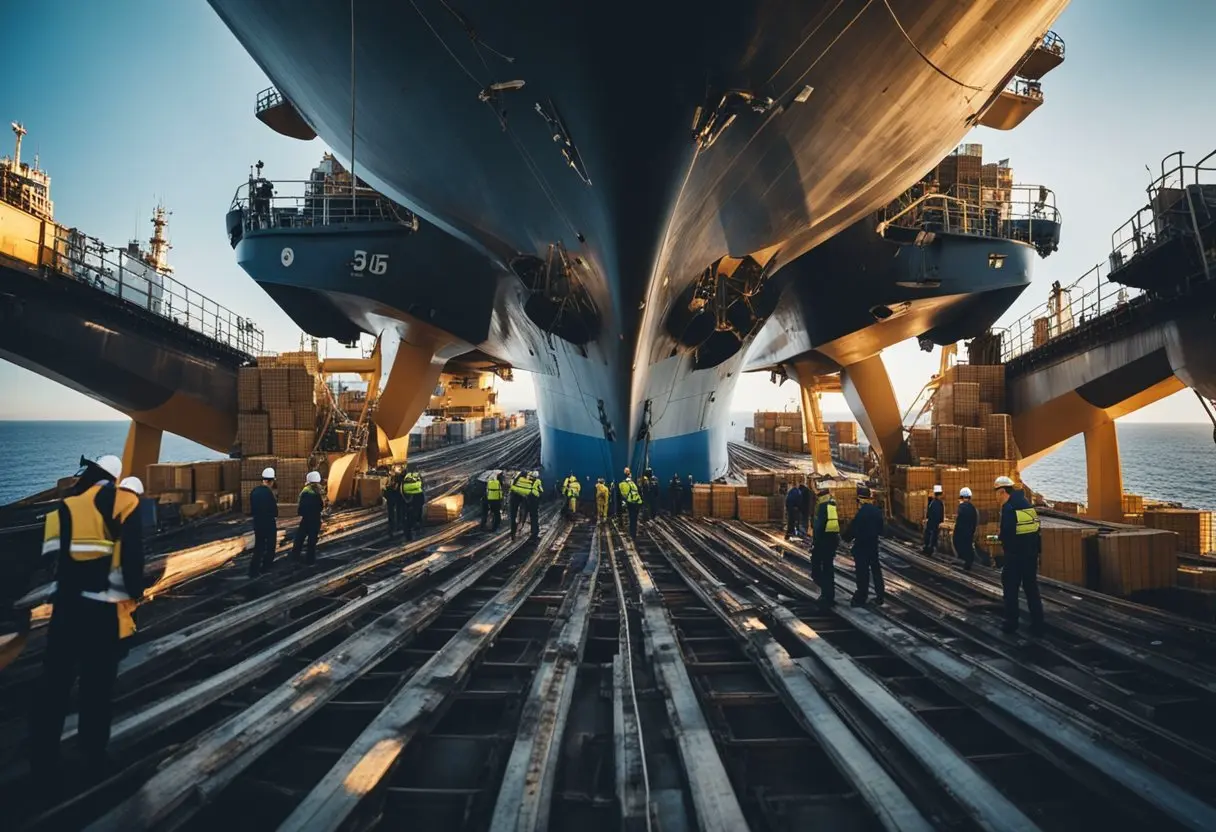
Cargo ships are complex vessels that require a multitude of roles to ensure their safe and efficient operation. Each crew member has specific duties that contribute to the ship’s success. Here are the roles and responsibilities of some of the key personnel on board.
Captain’s Duties
The captain is the highest-ranking officer on the ship and is responsible for the overall management of the vessel. Their duties include ensuring the safety of the crew and cargo, navigating the ship, communicating with port authorities, and making decisions in emergency situations. They also oversee the work of other officers and crew members.
Chief Officer’s Tasks
The chief officer, also known as the first mate, is responsible for the ship’s cargo operations, including loading and unloading. They also oversee the deck crew and ensure that all equipment is in good working order. Additionally, they assist the captain with navigation and communication.
Chief Engineer’s Role
The chief engineer is responsible for the ship’s mechanical systems, including the engines, generators, and other machinery. They oversee the engineering crew and ensure that all systems are functioning properly. They also maintain records of maintenance and repairs.
Able Seaman’s Work
Able seamen are experienced sailors who perform a variety of tasks on the deck of the ship. These tasks include navigating, steering, and maintaining the ship’s equipment. They also assist with cargo operations, including loading and unloading.
Ordinary Seaman’s Duties
Ordinary seamen are entry-level crew members who perform tasks such as cleaning and painting the ship, assisting with cargo operations, and standing watch. They are responsible for maintaining the ship’s cleanliness and ensuring that it is in good condition.
Overall, each crew member on a cargo ship plays a vital role in ensuring the success of the voyage. By working together and fulfilling their individual responsibilities, the crew can safely and efficiently transport cargo around the world.
Navigational Crew
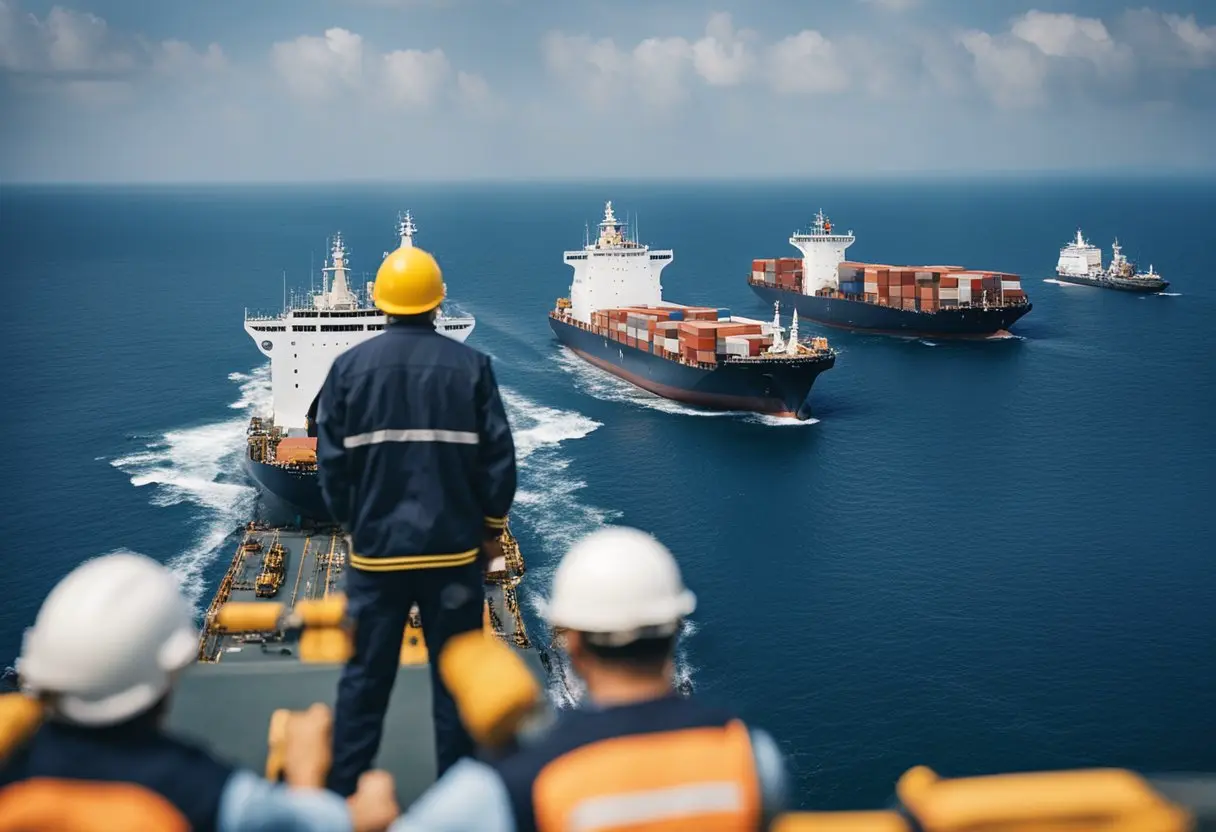
The navigational crew is responsible for the safe and efficient navigation of the cargo ship. This includes the captain, officers, and crew members who work in the deck department.
Navigational Officers
The navigational officers are licensed mariners who are responsible for the navigation and safe passage of the ship. They are divided into three ranks: the captain, chief officer, and second officer. The captain is the highest-ranking officer on the ship and is responsible for the overall operation of the vessel. The chief officer is second in command and is responsible for the safety of the ship and its crew. The second officer is responsible for navigation, communication, and safety equipment.
Radio Officer
The radio officer is responsible for maintaining communication with the shore, other ships, and aircraft. They are also responsible for maintaining the ship’s navigation and communication equipment, including radar, radio, and satellite systems.
Bosun
The bosun is responsible for the maintenance and upkeep of the ship’s deck and equipment. They oversee the deck crew and are responsible for the loading and unloading of cargo. They also ensure that the ship’s deck is clean and in good condition.
The navigational crew is essential to the safe and efficient operation of a cargo ship. They work together to ensure that the ship reaches its destination safely and on time.
Engineering Crew on ship
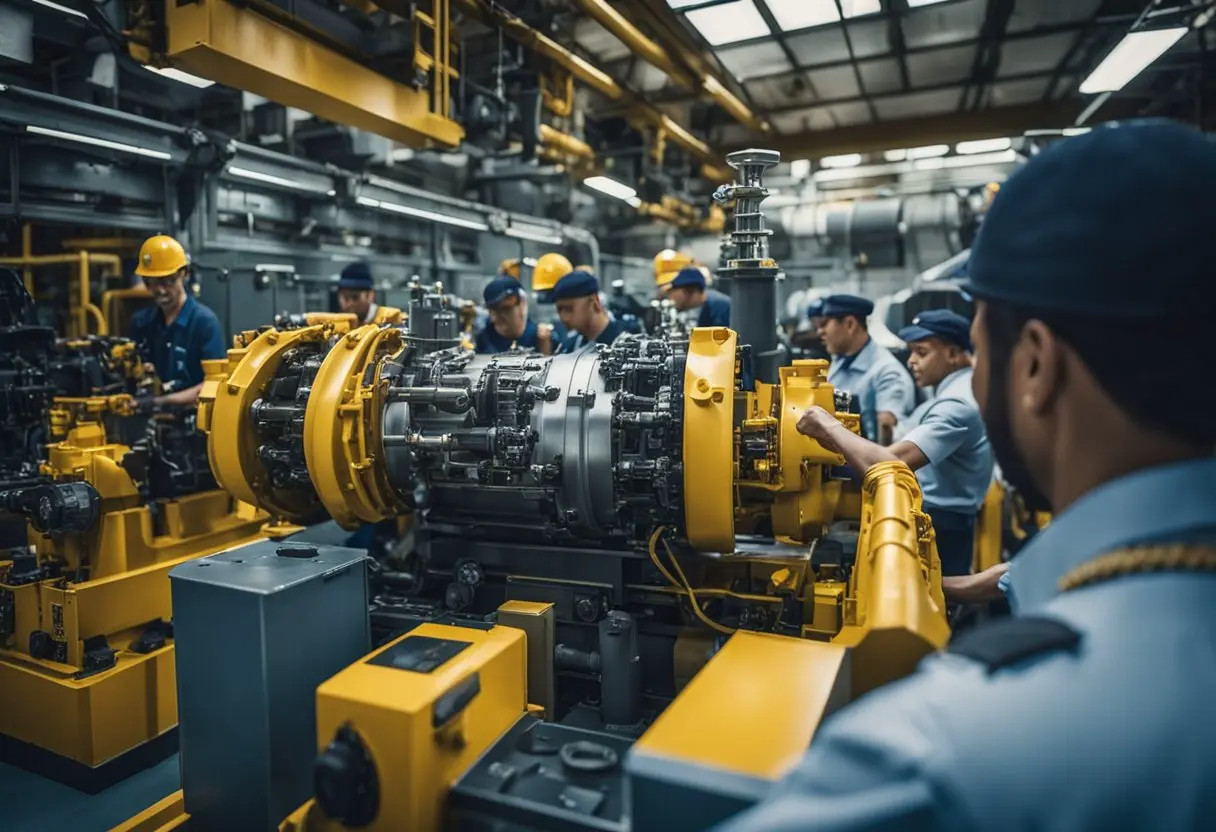
The engineering crew is responsible for the operation, maintenance, and repair of the ship’s propulsion system, electrical generation and distribution, and refrigeration and air conditioning. The engineering department is headed by the Chief Engineer, who is responsible for the overall operation of the engine room and the safety of the crew.
Electrical Technical Officer
The Electrical Technical Officer (ETO) is responsible for the maintenance and repair of all electrical and electronic equipment on the ship. The ETO ensures that all electrical equipment is functioning properly and is responsible for troubleshooting and repairing any electrical problems that arise. The ETO also maintains the ship’s communication systems, including the radio and satellite communication systems.
Engine Room Ratings
The engine room ratings are responsible for the day-to-day operation and maintenance of the ship’s engine room. The engine room ratings include the Second Engineer, Third Engineer, Fourth Engineer, and Engine Cadet. The Second Engineer is responsible for the operation and maintenance of the ship’s main engines, generators, and auxiliary equipment.
The Third Engineer is responsible for the operation and maintenance of the ship’s boilers, pumps, and other auxiliary equipment. The Fourth Engineer is responsible for the maintenance and repair of the ship’s electrical and electronic equipment. The Engine Cadet is an entry-level position that provides training and experience in the operation and maintenance of the ship’s engine room.
Overall, the engineering crew plays a critical role in the safe and efficient operation of the ship. Their expertise and knowledge ensure that the ship’s propulsion system, electrical systems, and other critical equipment are functioning properly at all times.
Safety and Security Procedures
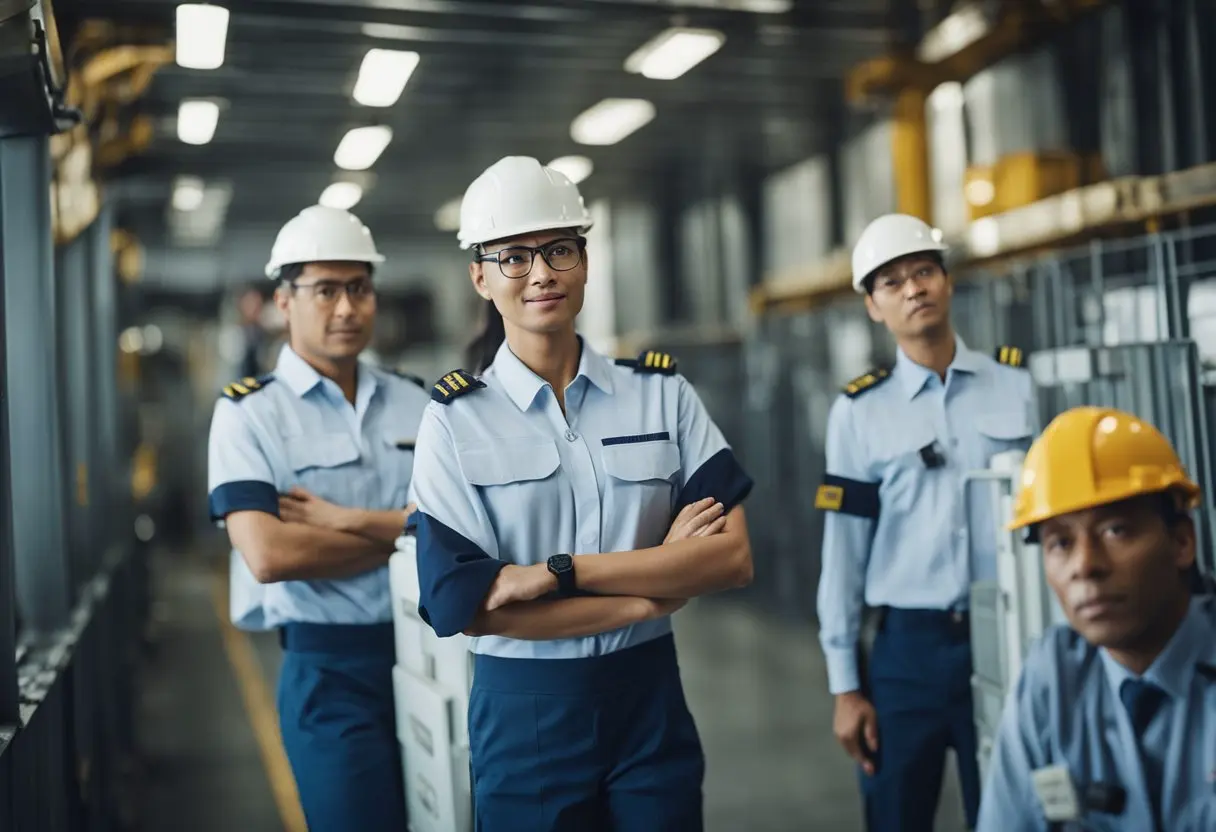
Safety Officer
The safety of the crew and the cargo is of utmost importance in cargo ships. For this reason, every ship has a designated safety officer who is responsible for ensuring that all safety procedures are followed. The safety officer is in charge of conducting regular safety drills and inspections to ensure that all equipment is in good working condition. They also ensure that all crew members are aware of the safety procedures and that they are trained to handle any emergency situation that may arise.
In the event of an emergency, the safety officer is responsible for coordinating the evacuation of the ship. They work closely with the captain and the crew to ensure that all crew members and passengers are safely evacuated from the ship. The safety officer also ensures that all necessary safety equipment, such as lifeboats and life jackets, are in good working condition and readily available in case of an emergency.
Security Personnel
Cargo ships are vulnerable to security threats such as piracy and theft. For this reason, every ship has a designated security officer who is responsible for ensuring the security of the ship and its cargo. The security officer is in charge of conducting regular security drills and inspections to ensure that all security procedures are followed. They also ensure that all crew members are aware of the security procedures and that they are trained to handle any security-related situation that may arise.
In addition to the security officer, cargo ships may also have security personnel on board. These personnel are responsible for ensuring the safety and security of the ship and its cargo. They may be armed or unarmed, depending on the level of threat. They work closely with the security officer and the captain to ensure that all security procedures are followed and that the ship and its cargo are protected at all times.
Cargo ships are complex operations that require a well-trained and experienced crew to ensure that everything runs smoothly. The safety officer and security personnel play a crucial role in ensuring the safety and security of the ship and its cargo. By following strict safety and security procedures, they help to ensure that the ship arrives at its destination safely and that the cargo is delivered intact.
Crew Training and Qualifications
Cargo ships require a highly skilled and trained crew to ensure safe and efficient operation. Crew members must have the necessary certifications and qualifications to work on a cargo ship.
Mandatory Certifications
The International Maritime Organization (IMO) sets the standards for mandatory certifications required by crew members. These certifications ensure that crew members have the necessary skills and knowledge to perform their duties safely and effectively.
The following table shows the mandatory certifications required by crew members:
| Rank | Certification |
|---|---|
| Captain | Master Mariner Certificate |
| Chief Officer | Chief Mate Certificate |
| Second Officer | Second Mate Certificate |
| Third Officer | Third Mate Certificate |
| Chief Engineer | Chief Engineer Certificate |
| Second Engineer | Second Engineer Certificate |
| Third Engineer | Third Engineer Certificate |
| Fourth Engineer | Fourth Engineer Certificate |
| Able Seaman | Able Seafarer Deck Certificate |
| Ordinary Seaman | Rating Forming Part of a Navigational Watch Certificate |
| Cook | Ship Cook Certificate |
Continuous Professional Development
Crew members must also undergo continuous professional development to maintain and enhance their skills. This includes attending training courses and workshops, as well as participating in onboard training programs.
Crew members are required to keep a record of their training and professional development activities. This record is known as a Seafarer’s Training, Certification, and Watchkeeping (STCW) certificate. The STCW certificate is an essential document that proves that a crew member has the necessary skills and qualifications to work on a cargo ship.
In conclusion, crew members on cargo ships must have the necessary certifications and qualifications to ensure safe and efficient operation. They must also undergo continuous professional development to maintain and enhance their skills.
Ship Management and Operations
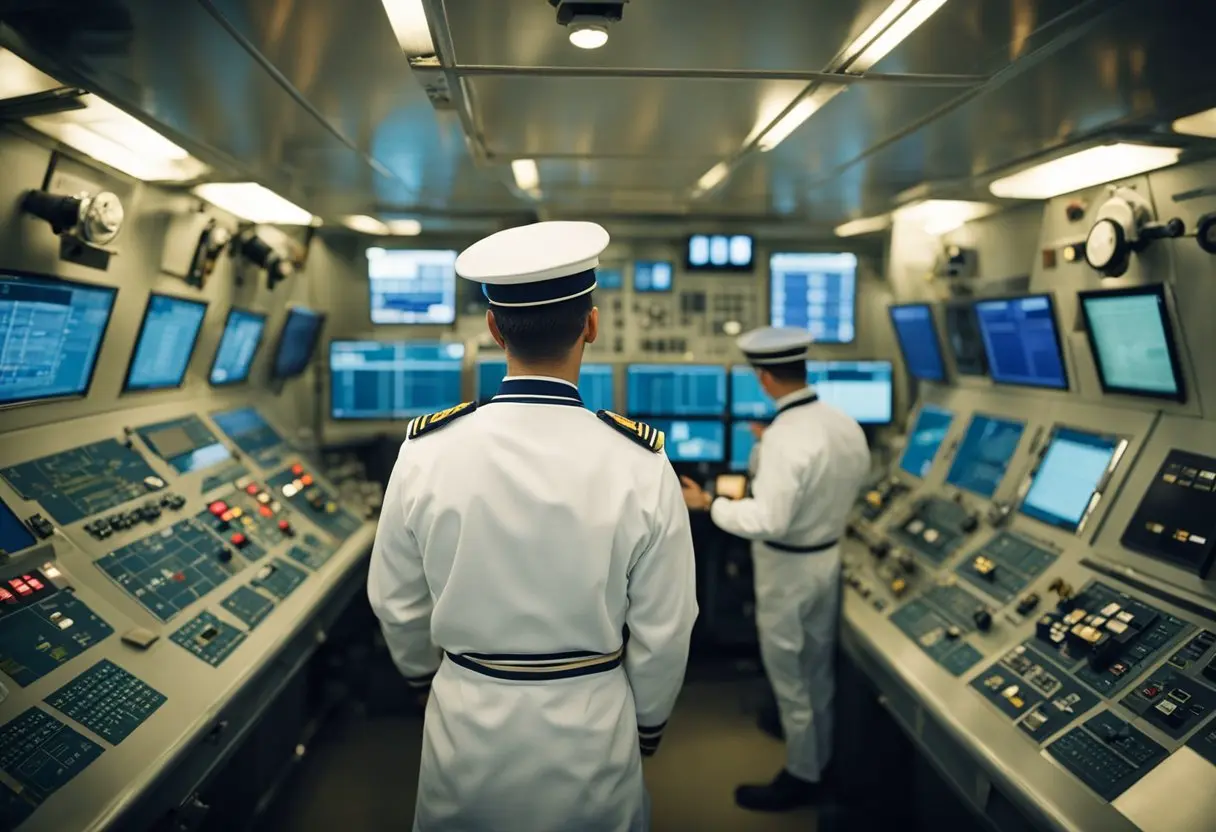
Managing and operating a cargo ship requires a team of skilled professionals with different ranks and responsibilities. The ship’s management and operations are divided into different departments, each with a specific role to play in ensuring the smooth functioning of the vessel.
Cargo Handling
One of the most critical functions of a cargo ship is handling the cargo. This involves loading and unloading the cargo, ensuring it is properly stowed and secured, and monitoring it throughout the journey. The ship’s cargo department is responsible for overseeing all aspects of cargo handling, from planning the loading and unloading operations to ensuring the cargo is properly stored and secured during transit.
Maintenance and Repairs
Maintenance and repairs are essential to keep the ship operating smoothly and safely. The ship’s engineering department is responsible for maintaining and repairing the ship’s engines, machinery, and other systems. The department is also responsible for ensuring the ship complies with all safety regulations and undergoes regular inspections.
Logistics and Planning
Logistics and planning are critical to the success of any cargo ship operation. The ship’s deck department is responsible for planning the ship’s route, monitoring weather conditions, and ensuring the ship arrives at its destination on time. The department is also responsible for coordinating with other departments to ensure the ship’s cargo is properly loaded, secured, and unloaded.
Overall, managing and operating a cargo ship is a complex task that requires a skilled and dedicated team of professionals. Each department plays a crucial role in ensuring the ship operates safely and efficiently, from cargo handling to maintenance and repairs to logistics and planning.
Conclusion
In conclusion, the cargo ship industry is a complex and highly coordinated operation that requires a wide range of professionals to work together seamlessly. The structured hierarchy of roles aboard a ship, encompassing the Deck, Engine, and Catering Departments, forms the backbone of maritime operations. Each department, with its distinct functions and responsibilities, operates in a coordinated manner to ensure the ship’s safety, efficiency, and the well-being of its crew.
Overall, the cargo ship industry is a vital component of global trade and commerce, and the professionals who work in this industry play a crucial role in ensuring the safe and efficient transportation of goods around the world.
Related Post:
